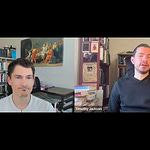From New Atheism to Renewed Engagement with Christianity
We discuss how the early 2000s were dominated by the New Atheists. This phase of cultural development was weighted in favor of the atheist point of view, making religion seem simplistic and stupid, and leading many young people to embrace secularism. Now, there appears to be an intriguing shift in which it suddenly became cool to convert to Christianity, even among individuals who once held prominent positions in the New Atheist movement.
Brendan notices that while there may be a cultural oscillation, he sees only a minority moving through a genuine process of deconstruction, or rational working-through of their prior faith, before eventually seeing some sort of reconstruction. He notes how people grappling with a lack of religiosity in their lives might be experiencing a reaction to the excesses of secularism. Instead of a full developmental move that includes and transcends atheism and nihilism, many are simply reaching for more concrete religious forms or reverting to fundamentalism.
We discussed Richard Dawkins unexpected claim that cultural Christianity is not so bad, and lamented the way Jordan Peterson, initially recognized for his Jungian archetypal nuance, has increasingly been pulled into more conservative theological circles and into reactionary politics.
Brendan and I both welcome moving beyond simplistic atheism, but we call for a deeply philosophical, metaphysically robust conversation rather than allowing ourselves to become stuck in reactive culture-war camps or old school conversions to parochial dogmas. We must embrace a developmental approach that genuinely acknowledges the limitations of both a purely rational atheism and a naive religious literalism.
Deconstruction Before Reconstruction and the Developmental Path
I affirmed the importance of a deconstruction process of one’s traditional faith before trying to rush into a reconstruction, suggesting that atheism is actually a necessary stage in the emergence of genuine faith. We must genuinely grapple with the prospect at least of atheism, if not nihilism, so that a more participatory approach to meaning-making can emerge on the other side. Brendan characterizes this potential path as still a minority phenomenon but one with transformative power.
Postmodern Logic, Jordan Peterson, and the Culture War
I described Jordan Peterson as reflecting precisely the kind of postmodern logic that he’s always railing against. I see him as a postmodern conservative who is basically saying, because all knowledge claims are indeed relative and perspectival, one must be prepared to forcefully re-impose order. Peterson’s appeal to certain conservative or patriarchal frameworks captures a defensive posture in a moment of chaos and breakdown and confusion, which has caused many disenchanted and alienated young men to gravitate toward him.
Ultimately, if we cannot find some basis for normative reconstruction, the progressive breakthroughs made possible by postmodern critique—such as an emphasis on diversity and the complexity of social power—risk being undone by reactionary moves that just want to return to previous norms. A new kind of “hieros gamos” or synthesis must emerge, rather than reverting to a kind of more imperialistic morality or slipping back into New Atheism 2.0.
Christ After Christianity, Universal Ethics, and Beloved Community
I attempted to recover some sense of the pre-Christian Christ impulse. While a religion built up around Jesus as a historical figure (and perhaps also around Christ as a newly revealed cosmological power), there remains a still implicit moral seed that is just beginning to take root. The deeper transformative aspects of Christianity are not yet fully realized, exemplified by the tension between an ethos of forgiveness and the continuing cultural gravity of rituals of sacrifice and mob (in)justice. I believe an aspect of the Christ impulse involves recognizing the individual soul as the locus of value, such that using violence against souls to achieve justice ultimately undermines the very basis of justice itself.
Brendan then expands upon Christianity’s cultural legacy, referencing scholars like Tom Holland and his argument that Western ethics, human rights, and democratic ideals have Christian origins. Christianity in some sense generated secularism and even fostered the scientific mindset, illustrating how the waning of religiosity ironically springs from Christianity’s own universalizing impulse. This same impulse can be seen in other Axial traditions, as the move to universal ethics is not uniquely Christian but an evolutionary expansion of humanity’s moral horizon.
I then introduced Josiah Royce’s concept of the “beloved community” (which became very influential for figures like Howard Thurman and Martin Luther King, Jr.), where individuals hold a “loyalty to loyalty as such.” Individuals may be the primary locus of values like justice, but individuals are not parachuted into this world already fully formed. Free individuals only arise in the context of loving communities.
I emphasized that real psychospiritual and moral transformation cannot be legislatively imposed upon a society by the state, but rather is incubated in cultural life out of inter- and intrapersonal relations. The beloved community is an experiment in “the task of inventing and applying the arts which shall win men over to unity,” as Royce puts it (The Problems of Christianity). If America is to be a truly “Christian nation,” it must be in that universal and multicultural sense, dedicated to “love of your neighbor,” rather than tribal identifications based on blood bonds.
Metaphysics and the Cosmic Significance of the Christ Event
Finally, we explored the coordinate perspectives of a “naturalistic Christology” and a “Christological naturalism.” Brendan framed this around the idea that “implicit, immanent in the natural world is a law-like pattern or Logos.” Rather than positing a supernatural incursion from “outside,” we both see the Christ event as something almost “unavoidable” once evolutionary and cultural conditions ripened.
I reference Teilhard de Chardin and Jung to argue that humanity’s intuition of some sense of a moral world order is not an arbitrary fluke or biopower play but a reflection of deeper patterns of complexification and evolving cosmic compassion. We both wrestled with the problem of theodicy, noting that a God who is “large and in charge” would seemingly have to take responsibility for evil and suffering, whereas a God who is “along for the ride” (or a “fellow sufferer” in Whitehead’s sense) may be more credible. If God is co-evolving with humanity, then perhaps God needed embodiment in order to become conscious. An originally unconscious spirit is gradually waking up, learning through the contingencies of the evolutionary process how to manifest deeper love.
In this post-Nietzschean vision, morality emerges from below but also points to a transcendental horizon. I think Jesus is already post-Nietzschean, beyond good and evil, in that his teachings (“hate your family,” “love your enemies”) call us to overcome conventional codes. Brendan notes that reading the Bible through a Jungian lens—where God is a literary character going through personality transformations—is a fruitful approach that integrates science, psychology, and mythopoetic imagination. We conclude that a coherent, integral cosmology must acknowledge the ongoing mutual transformation of God and humanity, leading to a more expansive sense of Christ’s evolutionary role.















Share this post